All countries have labour laws that entitle employees to avail of different types of leave and holidays. In order to comply with the law, employers and employees need to understand the various rules that are applicable.
Companies in the UAE offer different types of paid and unpaid leave to their employees. Different laws specify the minimum number of leave to be provided by employers. However, leave rules may vary from one employer to another. Many employers also offer additional types of leave as an extra benefit. It also depends on the nature of the business and industry sector.
Table of Contents
- 1. Types of Leave
- 2. Annual Leave (AL)
- 3. Sick Leave (SL)
- 4. Maternity Leave (ML)
- 5. Parental Leave
- 6. Ramadan Timings
- 7. Hajj or Pilgrimage Leave
- 8. Emergency Leave
- 9. Study Leave
- 10. Bereavement Leave
Types of Leave
This article compiles the various types of leave granted to private sector employees in the region.
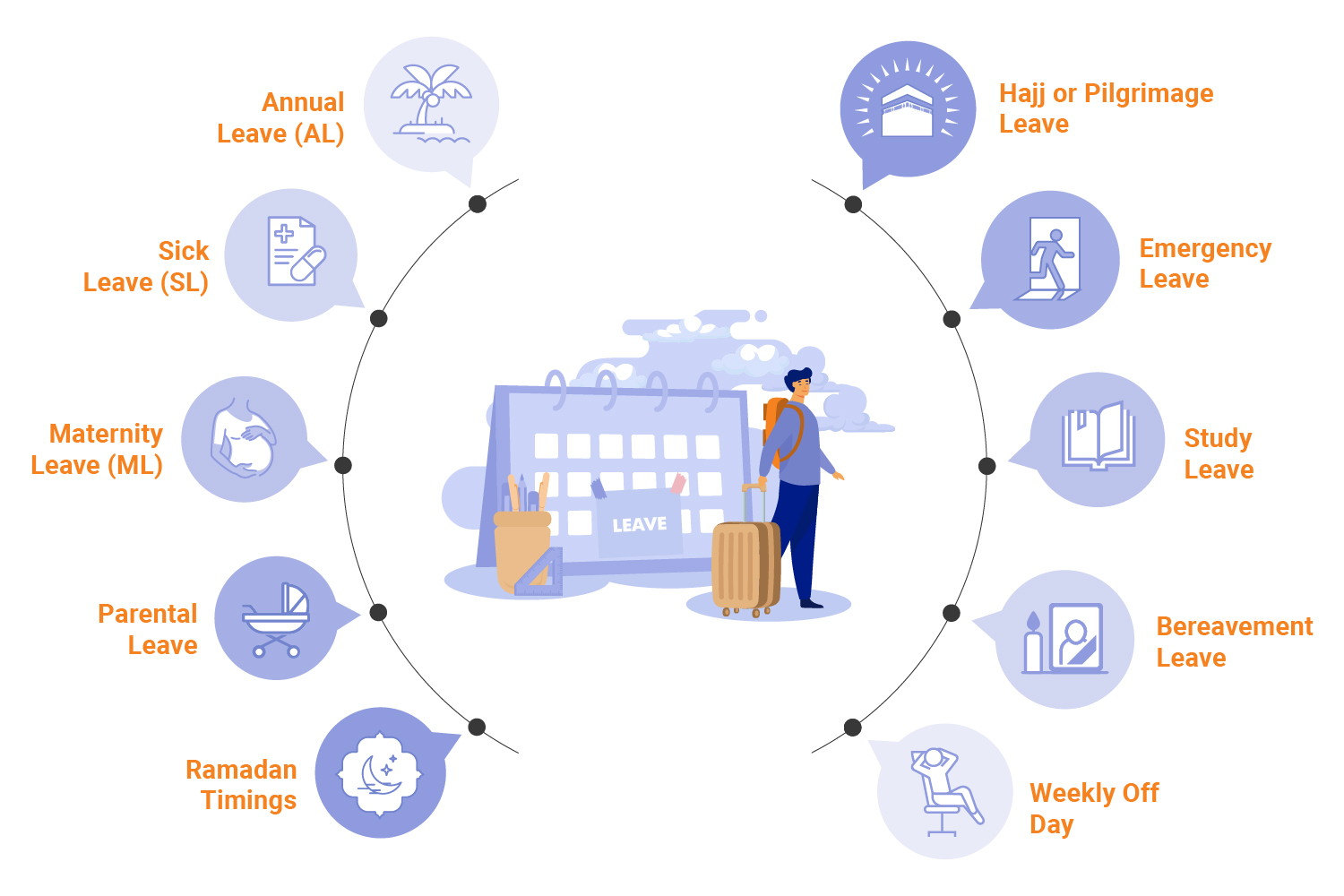
- Annual Leave (AL)
- Sick Leave (SL)
- Maternity Leave (ML)
- Parental Leave
- Ramadan Timings
- Hajj or Pilgrimage Leave
- Emergency Leave
- Study Leave
- Bereavement Leave
- Weekly Off Day
Annual Leave (AL)
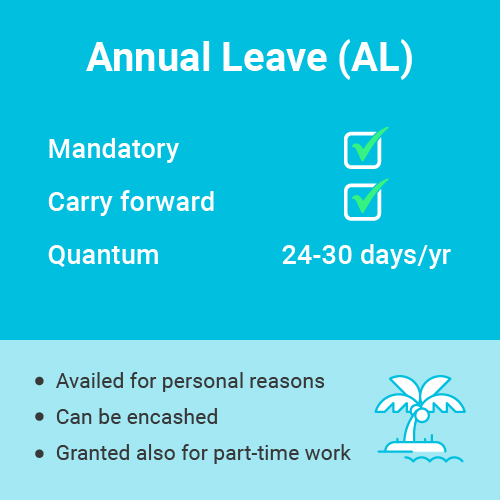
Employees can avail annual Leave for personal reasons such as a vacation, family function, or a festival that’s not declared as an official holiday.
Employees in the UAE can take two days’ leave every month after completing six months of service. If the person has completed one year, the leave entitlement is increased to 30 days in a year.
Annual Leave can be accumulated, taken together or carried forward to the next year if the company’s leave policy has a provision. In this case, the employers calculate Annual Leave based on the Basic salary. Even during termination, the pending leave is calculated as per the Basic.
This leave is also granted to part-time workers based on the number of working hours and terms of the contract.
Sick Leave (SL)
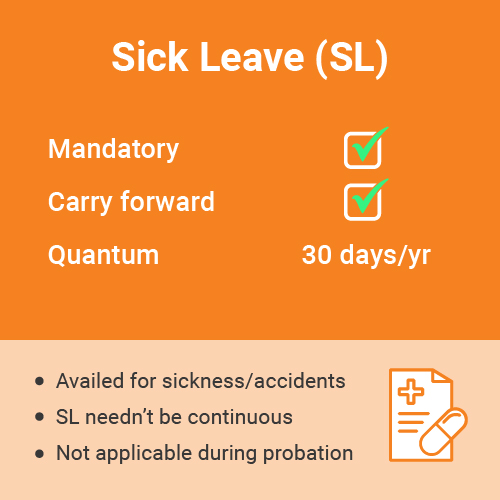
Sick Leave is mandated by the UAE law and allowed if an employee falls sick or meets with an accident. The employee is expected to inform the employer in three days by providing a medical report.
Employees can take Sick Leave for a maximum period of 90 days in a year. The leave can be either continuous or intermittent. As per the law, employers will pay the entire salary for the first 15 days, half for the next 30 days and nothing for the remaining 45 days.
Employees do not qualify for Sick Leave during probation or if they have fallen sick due to acts of misconduct like consumption of alcohol. Also, they are not eligible if they have violated any safety rules. If sickness happens during their Annual Leave, that leave is considered
Annual Leave and not Sick Leave.
Maternity Leave (ML)
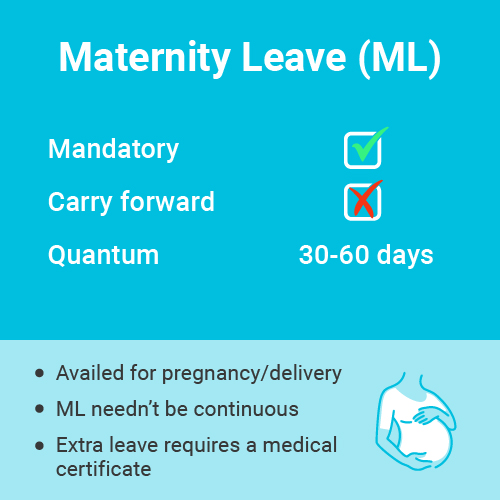
Maternity Leave (ML) is provided to female employees for their delivery. They can avail of this leave before and/or after childbirth.
As per the law, an employee is eligible for 45 days of leave with full pay and 15 days of leave with half pay. In case of any illness due to pregnancy, she can take an additional leave of 45 days without pay. In case the baby is sick or has any disability, the mother can take another 30 days of leave with pay.
A request for leave extension due to sickness during maternity leave in the UAE must be supported by a valid medical certificate. After returning to work, she can also take two additional breaks (one hour each) for a period of six months. An employer cannot terminate the employee during maternity leave, citing that as a reason.
Parental Leave
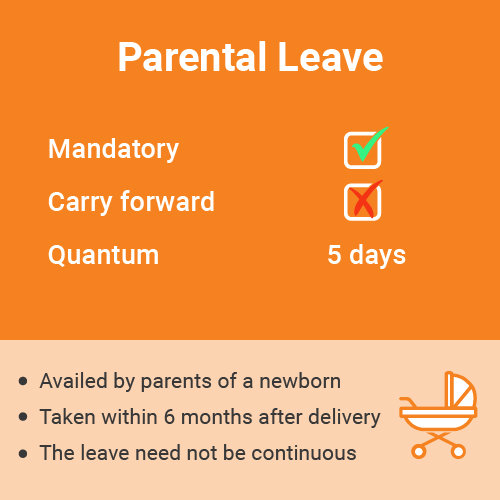
A paid leave offered to the parents of a newborn child, Parental Leave can be availed anytime within six months from the delivery date. This leave is to ensure that the parents are able to take care of the child well, even during an emergency.
As per the law, employees can take five working days of Parental Leave in a year. The UAE is the first Arab country to offer this type of leave to its private sector employees.
Parental Leave has been introduced to encourage family cohesion at home and gender equality in the workplace. It is one of the many measures taken to inspire more people to join the private sector.
Ramadan Timings
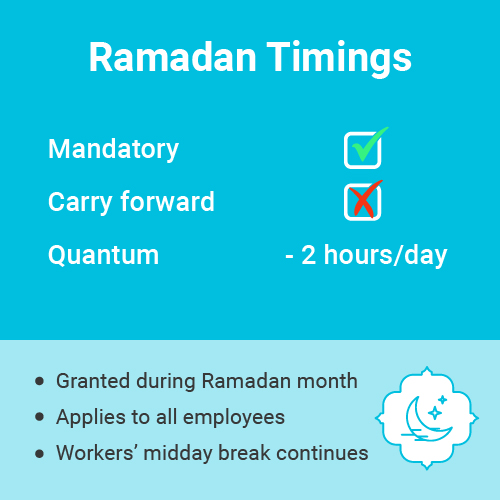
Muslims dedicate the holy month of Ramadan to fasting and prayers. Since work has to happen parallelly, organisations reduce the number of working hours for the benefit of their employees.
During Ramadan, employers usually do not have a full-day schedule for their staff. They reduce the number of working days by two hours every day.
Ramadan Timings apply to all employees regardless of their faith. Also, this benefit of relaxation applies to people who do indoor or outdoor work. But construction workers will continue to get their midday break from 12 p.m. to 3 p.m. This benefit is to minimise their risk of exposure to heat.
Hajj or Pilgrimage Leave
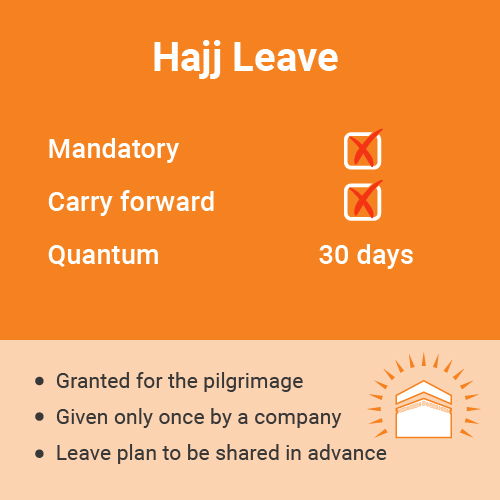
Muslim employees can take a Hajj Leave to go on a pilgrimage to the holy city of Mecca in Saudi Arabia.
Hajj Leave is an unpaid leave granted to employees for a maximum period of 30 days. This leave can be taken only once during their tenure with the present company.
Employees have to discuss their leave plan in advance with their manager so that the work can be assigned to others during their absence.
Emergency Leave
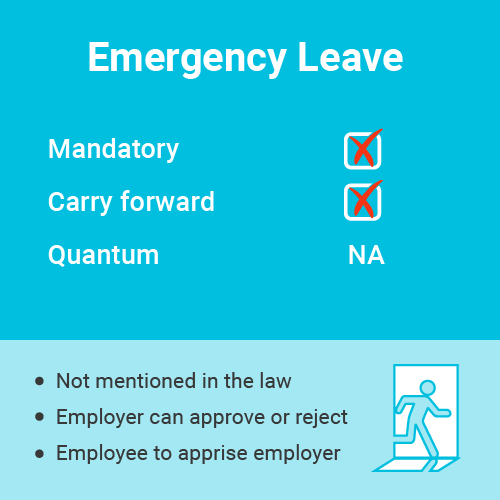
It’s not possible for an employee to plan every leave. Emergencies sometimes happen while an employee is at work. Therefore, employers usually grant an Emergency Leave whenever an unforeseen incident happens.
Since it could be difficult to know the exact number of leave days required for the emergency, employers remain flexible to a certain extent. But the employee is expected to apprise the manager at the earliest so the regular work is not hampered.
Since the scope of the law does not include an Emergency Leave, the concerned employer has to take a call. The permission depends on the leave rules of the company. The employer can decide whether to pay or not.
Study Leave
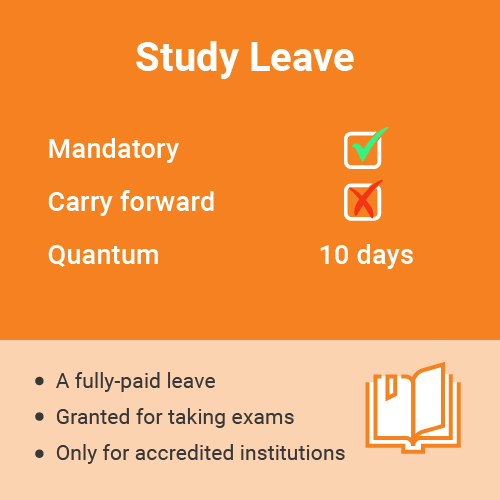
The UAE encourages people to pursue higher studies for professional development. Employees who have enrolled with an accredited educational institution are eligible for paid Study Leave.
The required number of leave days would depend on the number of subjects/examinations the student has to take. Therefore, the law has allowed 10 days of Study Leave in a year.
In order to avail of this leave, the working professional must have completed two years of service in an organisation.
Bereavement Leave
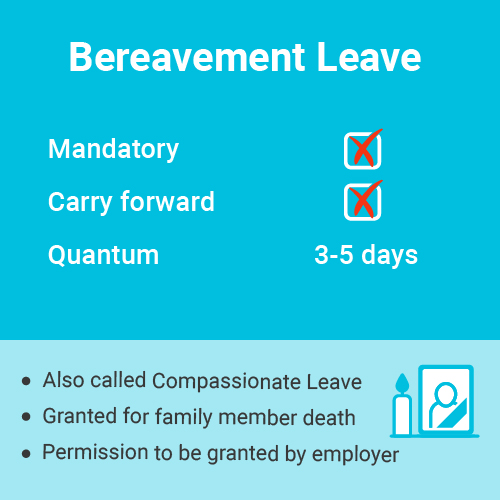
Employers grant Bereavement Leave (Compassionate Leave) to their employee in case someone in the latter’s family dies.
A Bereavement Leave of five days is allowed in case of the death of a spouse. The leave is given for three days if other immediate relatives (father, mother, son, sibling or grandparent) die.
Since different companies offer different benefits, employees have to read the leave policy of their organisation before applying for a Bereavement/Compassionate Leave in the UAE.
Weekly Off Day
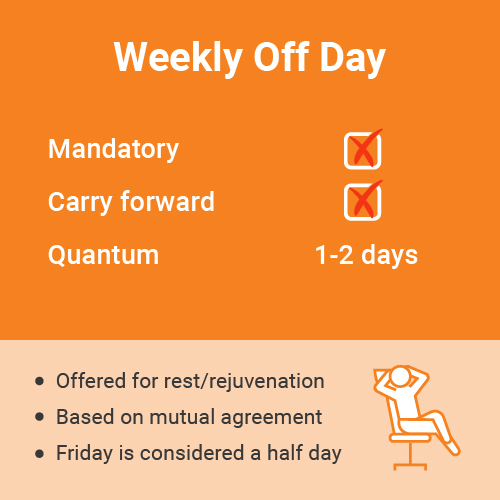
Since all employees need rest to rejuvenate themselves and also perform their personal chores, employers in the UAE offer them a weekly off day.
Employers give one or two days’ leave based on their leave policies and the contract of the employees. The contract is drafted and signed after a mutual agreement between an employer and employee.
The UAE law made changes to the working weekdays for government employees. They now work from Monday to Friday. But Friday is a half day. Even private-sector employers can align their policies accordingly for the benefit of their employees and their families.
In Conclusion
The UAE labour law aims to strike the right balance between productivity and liberty. Therefore, employers are expected to grant leave whenever the employees really need them. Even the employees are expected to use them prudently and honestly. The above roster of leave types is only a quick reference guide and not an official document.
